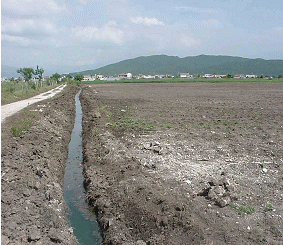Sidgrains Waste Water Project
The National Commission on Science and Technology solicited the technical expertise of various stakeholders and with the co-operation of the West Indies Home Contractors Ltd., embarked on a programme to utilize the maturation and stabilization ponds in Greater Portmore for evaluating the benefits of this technology on a semi-commercial scale. Sid-Grains Limited was established to manage and evaluate the The Sidgrains Farm demonstration project, utilizing some 100 acres (40 ha) of land in close proximity to the ponds. Sorghum was the primary crop cultivated with secondary crops including tomato, sweet pepper, corn and okra.
Sidgrains Farm

[custom_headline level=”h2″ looks_like=”h3″ accent=”true”]Tomato[/custom_headline]
[column type=”one-half”]
[promo style=”text-align: center;” image=”https://ncst.gov.jm/wp-content/uploads/2014/09/Tomato.jpg” alt=”Tomato”]
The overall goal of the project was to determine the economic feasibility and sustainability in using treated domestic wastewater for the production of sorghum and other secondary crops in an environmentally safe and reproducible manner. The objectives were:
- to develop a reproducible technology package utilizing waste water for irrigation of agricultural crops
- to improve aquifer recharge and soil quality
- to reduce the volume of potable water used for irrigation purposes
- to sensitize the public to the value of waste water for agricultural crop production
[/column]
[column type=”one-third” last=”true”]
[promo style=”text-align: center;” image=”https://ncst.gov.jm/wp-content/uploads/2014/09/Sorghum2.jpg” alt=”Sorghum”]
Sorghum
Funding was provided through the Technology Investment Fund through the National Foundation for the Development of Science and Technology, Trafalgar Development Bank, National Investment Bank of Jamaica and the Agricultural Development Bank.
[/column]
[column type=”one-half”]

[/column]
[column type=”one-half” last=”true”]
Members of the Board of the Waste Water Task Force including representatives from the following institutions:
- National Commission on Science & Technology Secretariat
- Scientific Research Council
- Trafalgar Development Bank
- Jamaica Bureau of Standards
- National Environmental and Planning Agency
- Rural Agricultural Development Authority
- Jamaica Broilers Group
- Ministry of Agriculture
- Ministry of Water
- National Investment Bank of Jamaica
[/column]
[line]
[custom_headline type=”left, center, right” level=”h2″ looks_like=”h3″ accent=”true”]Economical[/custom_headline]
- Significant savings may be incurred by the use of wastewater: for every litre of wastewater used in agriculture, one litre of potable water is available for domestic purposes.
- Yields obtained using wastewater were comparable and in most cases surpassed those obtained using conventional practices that is, potable water and fertilizer.
- Treated wastewater can be made available for sale as irrigation water
- Use of waste water reduces the cost of fertilizers
- Use of wastewater creates employment opportunities in agriculture in highly urbanized areas.
[custom_headline type=”left, center, right” level=”h2″ looks_like=”h3″ accent=”true”]Environmental[/custom_headline]
- Significant volume of wastewater being pumped into the Harbour can be reused as an important resource.
- Studies conducted by the Water Resources Authority indicated that with the increase acreage and volume of wastewater used, there would be a positive impact on the aquifers.
- Successive crop cycles indicated improvement in marginal lands due to irrigation by wastewater. This can contribute to greening of certain arid areas.
[custom_headline type=”left, center, right” level=”h2″ looks_like=”h3″ accent=”true”] Science and Technology [/custom_headline]
- Treated waste water contains sufficient nutrients needed for the growth of various agricultural crops such as sorghum, yellow corn, okra, cucumber, sweet pepper, hot pepper and tomato.
- The irrigation regime used in the trial (flood irrigation) was appropriate for the crops cultivated.
- Crops produced were safe for human consumption as demonstrated by the chemical and microbial analyses.
- Sensory characteristics of vegetable crops produced by Sid-Grains Ltd. were comparable with conventionally produced crops and had a high rate of acceptability by distributors and consumers.
- Nutrients appeared to be more available for plant growth when delivered in the wastewater than through the use of fertilizer.
